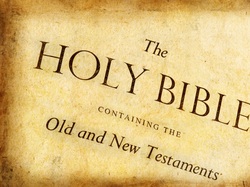Chad's Response: Matters of moral discrepancy elicit passionate debate from liberal and conservative scholars alike. One of the supposed moral discrepancies in the Old Testament is that of the command of God to destroy all of the people currently inhabiting the Promised Land (Deut. 20:17). The wording of the text indicates that no living soul was to be left alive.[1] Stephen Davis finds this command contradictory to the standards of the Bible when he writes,“I believe the slaughter of innocent people violates the moral standards of the Bible itself (Gen. 9:6; Ex. 20:13; Luke 18:20; Rom. 13:9). I find no explanation successful and must conclude that the Israelites misunderstood God’s will.”[2] Norman Gottwald agrees with him when he states, “the attempt to render theological justification to the Hebrew claim upon the land by depreciating the Canaanites is a thankless and misguided task.”[3] This, however, is not a Biblical contradiction for two main reasons. First, the Israelites acted as the hand of God in carrying out swift justice upon the sinful Canaanites. They acted not as ravenous murderers given to the kind of killing forbidden in Davis’ proof texts, but as solemn instruments whereby the Canaanites were punished by God. To argue for any sort of innocence on behalf of the Canaanites is to misunderstand the nature of man’s depravity (Rom. 3:10). The second theological justification is the very nature of the Israelites themselves. God knew that the temptation to become involved in the Canaanites’ wickedness would be strong for His people. The only means by which the temptation could be eliminated was by the destruction of the people in the land.[4] There is no moral discrepancy here, or in any other instance in the Bible.[5] [1] C.F. Keil and F. Delitzch, The Pentateuch, trans. James Martin (Grand Rapids: Wm. B. Eerdmans Publishing Co., 1968), 403. [2] Stephen T. Davis, The Debate About the Bible (Philadelphia: The Westminster Press, 1977), 97-98. [3] Norman K. Gottwald, A Light to the Nations (New York: Harper & Brothers, 1959), 151. [4] Peter C. Cragie, Deuteronomy. The International Commentary on the Old Testament (Grand Rapids: Wm. B. Eerdmans Publishing Co., 1976), 276. [5] One more famous contention of a moral discrepancy is the understanding by liberals that God intentionally deceived Jeremiah in Jeremiah 20:7, thereby contradicting his nature. Geisler and Howe prove that there is not discrepancy here in The Big Book of Biblical Difficulties, p. 277. Caleb's response:One of the most controversial moral discrepancies that the critics bring up is Jephthah’s sacrifice of his daughter in Judges 11. Critics claim that Jephthah was obligated by God to fulfill his vow and kill his daughter.[1] God in this view must be cruel.[2] Gleason Archer argues against the claims of these critics and says it would be absurd for any Israelite to think committing such an act, as killing their offspring to fulfill some kind of Divine obligation would please God.[3] Archer states that Jephthah did not in fact kill his daughter but offered her as a living sacrifice unto God causing her to live as perpetual virgin thus ending the line of Jephthah. This is why Jephthah’s daughter was permitted to mourn for two months (Judges 11:37-38). She was mourning, not her death, but her permanent virginity. The New American Commentary disagrees with Archer in its argument against the critics and presents Jephthah as “outrightly pagan.”[4] The story of Jephthah in this view ends with the death of his dauther and paints Jephthah as the “tragic figure, presenting a pathetic picture of stupidity, brutality, ambition, and self-centeredness.”[5] Another example of proposed moral discrepancies is the claim that God condones lying.[6]
[1] James M. Meyers and Phillips P. Elliot, “The Book of Judges,” The Interpreters Bible, vol. 2, (New York: Abingdon Press, 1952-57), 771. [2] Ruth Hurmence Greene, The Born Again Skeptic’s Guide to the Bible (Madison: Freedom from Religion Foundation, 1979), 98. [3] Gleason L. Archer. Encyclopedia of Bible Difficulties. (Grand Rapids, MI: Zondervan), 1982. 64 [4] Daniel I. Block, “Judges, Ruth.” In Vol. 6 of The New American Commentary. Edited by E. Ray Clendenen and Kenneth A. Matthews. (Nashville: Broadman and Holman, 1999), 367. [5] Ibid. 372 [6] The claim is made that God condones deceit in I Samuel by David and Solomon. Gleason L. Archer gives a solution to this discrepancy in the Encyclopedia of Bible Difficulties (Grand Rapids: Zondervan Publishing House, 1982), 175-178. Posted by Caleb
0 Comments
Leave a Reply. |
AuthorsCaleb Phelps Archives
July 2021
|
 RSS Feed
RSS Feed